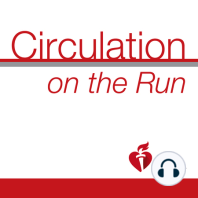18 min listen
Circulation November 5, 2019 Issue
ratings:
Length:
23 minutes
Released:
Nov 4, 2019
Format:
Podcast episode
Description
Dr Carolyn Lam: Welcome to Circulation on the Run, your weekly podcast summary and backstage pass to the journal and its editors. I'm Dr Carolyn Lam, associate editor from the National Heart Center and Duke National University of Singapore. Dr Greg Hundley: And I'm Dr Greg Hundley, associate editor from the Poly Heart Center at VCU Health in Richmond, Virginia. Dr Carolyn Lam: Greg, this issue is super exciting. It's the ESC simultaneous publication issue, isn't it? So the original papers were simultaneous publications at the European Society of Cardiology meeting this year. Dr Greg Hundley: Oh, wow. Carolyn can't wait to get to these. So Carolyn, later we're going to listen to the authors of this feature discuss the association between ICD use and all-cause mortality in a contemporary heart failure reduced ejection fraction cohort and examine relevant subgroups. So Carolyn, I'm going to get started with my first paper and it's a randomized trial of one hour, one-hour deponent T protocol and suspected acute coronary syndromes and it's a rapid assessment in emergency rooms and it's from professor Derek Chew from Flinders Medical Center. High sensitivity troponin assays promise earlier discrimination of MI, yet the benefits and harms of this improved discriminatory performance when incorporated within rapid testing protocols with respect to subsequent testing and clinical events has not been evaluated in an in-practice, patient level, randomized study. So this multicenter study evaluated the non-inferiority of a zero to one hour, zero to one-hour, high sensitivity troponin T protocol compared with a more traditional zero to three-hour mask, high sensitivity troponin T protocol in those suspected with ACS. Dr Carolyn Lam: Interesting. So what did the study show? Dr Greg Hundley: So participants in the zero to one-hour arm were more likely to be discharged from the ED quicker and that would be expected. So 45% versus the standard arm, which was 32%. Also their median ED length of stay was shorter, and we would expect that. Four and a half versus five and a half hours. Those randomized to the zero to one-hour protocol were less likely to undergo functional cardiac testing. The zero to one-hour high sensitivity troponin T protocol was not inferior to standard of care and among patients discharged from the ED, the zero to one-hour protocol had a negative predictive value of 99.6% for 30-day death or MI. So Carolyn, how about your first study? Dr Carolyn Lam: Well, from MI risk stratification to heart failure risk stratification. I'm going to tell you about a paper describing the TIMI Risk Score for heart failure in diabetes, which is a novel integer base clinical risk score for predicting hospitalization for heart failure in patients with type two diabetes. This is from Dr Mark Sabatine and the TIMI study group who developed a clinical risk score for heart failure hospitalization in more than 8,200 patients with type two diabetes in the placebo arm of saver TIMI 53, as well as externally validated this score in more than 8,500 patients with type two diabetes in the placebo arm of declare TIMI 58. They found that five clinical variables were independent risk predictors of heart failure hospitalization. These were prior heart failure, history of atrial fibrillation, coronary artery disease, estimated GFR, and urine albumin-to- creatinine ratio, a simple integer base score from zero to seven points. Using these predictors identified a more than 20 full gradient of heart failure hospitalization risk in both the derivation and validation cohorts with high SES statistics. Although the relative risk reductions with dapagliflozin were similar for patients across the risk scores, the absolute risk reductions were greater in those with higher baseline risks. Dr Greg Hundley: Wow, Carolyn. So tell us what are the clinical implications of this really thorough study? Dr Carolyn Lam: In summary, the risk score had excellent discrimination in tw
Released:
Nov 4, 2019
Format:
Podcast episode
Titles in the series (100)
Circulation January 23, 2018 Issue by Circulation on the Run
